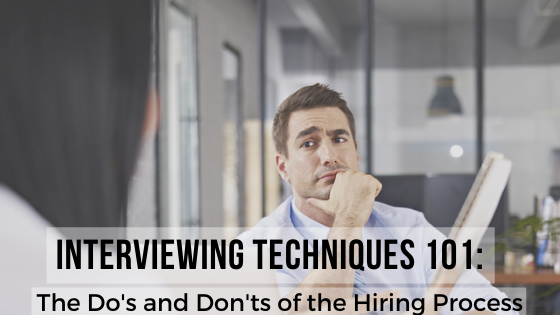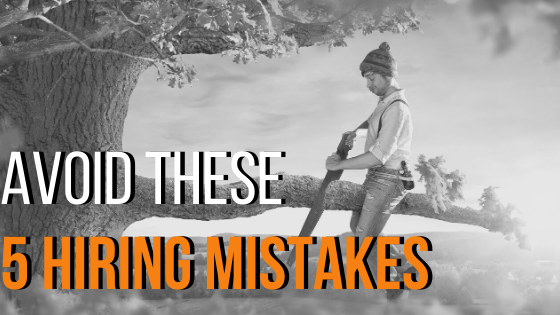
You might knee-jerk to thinking that interviews are predominantly stressful for candidates, but this would frequently be an unfair assessment of the situation. While managers need to make good hires, they also want to leave the candidate with a positive impression of themselves and the company.
The recruitment process can be lengthy (although it doesn't have to be), and as you would rightfully expect a candidate to come to the interview ready, you, as a hiring manager, should be equally well prepared.
Using practical hiring strategies can change the outcome of interviews and allow you to improve your job postings, interview skills, and the thought processes behind posting a job opportunity. Here are some effective and simple interview tips for hiring managers looking to improve their approach to interviewing.
Before the Interview
1. Have an idea of who you'll be talking toTake the time to look at any notes from HR or the person who conducted the screening interview, as well as a recent resume, LinkedIn page, and any other documents they have submitted. If the candidate’s other social media pages are public, give those a look as well. These can save you loads of time in the event of a personality lemon, and they can also provide a basis for early-interview small talk, which will be discussed in a few paragraphs.
2. Learn all there is to know about the position
It's important to understand the details of the role for which you are hiring if you want to match an ideal candidate to the position. Having a thorough understanding of role-specific skill sets, certifications, educational requirements, and requisite experience will all put you in a good position to identify the best candidates.
You should also think about the specific projects the candidate would work on and what KPIs or measurements of success are important to the role. This information will allow you to ask better, more targeted questions of the candidate.
3. Go into the interview with a plan
Interviewing a candidate without a plan is a recipe for failure, so you’ll want to map out how you’d like the interview to progress. This is especially important if you end up with a particularly charismatic or garrulous candidate. Some people can talk about anything for as long as you let them, so you’ll want to have a plan for this contingency that doesn’t require you to appear impatient.
Additionally, if you don’t have much experience interviewing, a working outline will give you an added boost of confidence and direction. It’s something to fall back on if need be. You should also ask experienced colleagues to run a mock interview with you. This will produce valuable insights into how your interview could go and allow you to make adjustments before the rubber hits the road.
During the Interview
4. Greet the candidate
You want the candidate to feel as comfortable as possible, so feel free to take a few minutes at the start of the interview for some friendly conversation to help break the ice. Remember that you are the face of the company and a prospective boss to the candidate, so it is ideal to leave a positive impression whether you hire a given person or not.
A note on small talk: While being friendly is important, you want to keep the conversation on track and relevant to the role, so err on the side of short and sweet.
5. Respect the candidate's time
Things happen. Meetings run late, surprise fires need to be put out, children do predictable but inconveniently childish things. If you happen to get held up, find a way to reach out to the candidate and make them aware of the situation. You don’t want a winner walking out because you were running late and didn’t think to touch base.
6. Take Notes, Listen more, Talk less
Hiring can become complex, especially when interviewing multiple candidates for various roles within your organization or team. Taking notes will help you keep track of candidates and how their interviews went.
It is also important to let candidates answer your questions completely. Listening and allowing them to fully answer each question will prevent you from missing details that you wouldn’t know were that important if didn’t let them elaborate.
After the interview
7. Make a reportYou will want to review your notes from the interview. Adding notes to your company’s CRM is a great starting point, but if you have an ATS (applicant tracking system), this would be the ideal place to store notes on interviewed candidates.
8. Follow up with the Candidate
Make sure to let the candidate know if they got the job (okay, most people don’t forget this step, but in the name of covering all my bases…), didn’t, or will be moving along to the next stage of the hiring process. Hiring managers often forget to follow up when the answer is “no,” which leaves the candidate in the dark as to where they stand, stands to damage the company’s reputation, and generally adds a pinch of misery to the world that didn’t need to be there. So make sure you call back. If nothing else, it’s just good manners.
9. Review your work
Take the time to review your interview and how it went. Are there things you would like to have done otherwise? Different questions you should’ve asked? Maybe you started the interview by talking about yourself, your experience, or the company and would prefer to have started with the candidate and their experiences. These are all finer points that you can hone over time, but only if you are aware of them. Unfortunately, many of the particulars aren’t that memorable unless you recount the experience shortly after the fact, so make sure to conduct a review after each round of interviews.
You’re ready to start interviewing
Great interviewers earn their chops over years of experience, so don’t be too hard on yourself if it takes a few rounds to start feeling confident. Asking the right questions can pick a needle from a haystack and land you a stellar employee, but a 30-minute conversation always risks leaving something to be desired. You’re interviewing people, after all. We’re complicated.
So give yourself a little grace. Sometimes it will be ridiculously hard to find someone. Other times you’ll end up going with a candidate who proves less impressive than they first appeared. Then again, sometimes your intuition that a candidate is just right will prove correct.
The longer you’re at this, the better you’ll get. But improvement, in interviewing as in all things, requires preparation and reflection.















.png?width=800&name=Is%20the%20Hybrid%20Recruiting%20Model%20right%20for%20your%20business_%20(1).png)